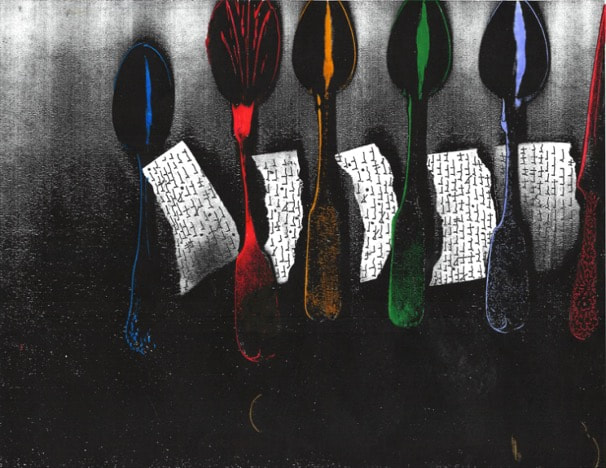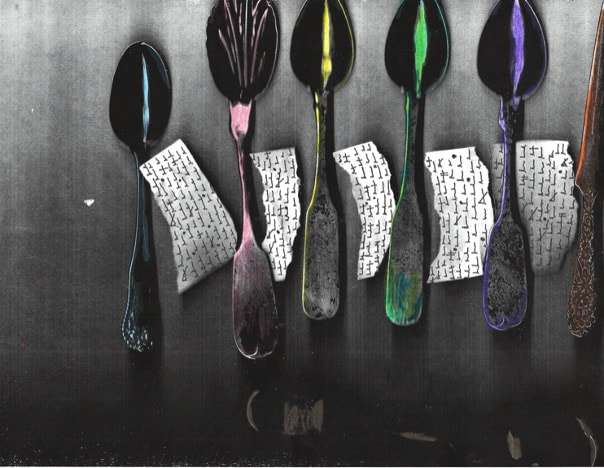Rehearsal Dinner 1 & 2, Nadia Arioli, 2023. Scan of utensils, modified with colored pencils, markers, and pen.
We Need to Talk About the Spare Room
Matthew Batham
George couldn’t remember coming downstairs, but now he was standing in the kitchen doorway, watching his wife, Vera, prepare some kind of stew. He had something important to tell her about the spare room. It took a few moments for him to piece everything together in his head, and after he did, he thought he must have it wrong because it sounded too far-fetched.
Vera looked so pretty. George loved it when she wore her white hair in a messy bun like now. She’d never cut her hair short like other women over seventy. She still let it down sometimes, the beautiful snowy waves falling across her slightly stooped shoulders.
There was music playing on an old tape deck Vera kept especially for the kitchen. Chopin. That was unlike her;. she was more of a rock-n-roll girl. George was the one who liked classical.
"Vera,” he finally said.
She looked up, placing the knife she’d been slicing carrots with next to the chopping board. “Yes, love?”
“I haven’t been entirely honest about why I spend so much time in the spare room.”
“Oh,” Vera threw the diced carrots into the pot.
“The truth is, the spare room is actually a time portal to the Pliocene Epoch, and I’ve been visiting there regularly since we moved here. I want to take you there too, Vera.”
Vera sniffed, and looked from George to the cooking pot. “Okay,” she said. “I can put the casserole on a low heat.”
The door to the spare room looked innocuous enough. George wondered again if he’d gotten it wrong. It did seem a bit unlikely. Maybe he was getting confused again. What were the chances of a spare room door leading to the Pliocene Epoch—his favorite prehistoric period. Hadn’t he lectured on it for years? Yes, of course he had. What a stupid question.
Beside him, Vera cleared her throat. “So when you open this door, we’ll see a prehistoric landscape?”
George gripped the door handle. “Yes. I think so.”
“Thank god it isn’t the bathroom that’s the portal!” said Vera. “Imagine having to avoid a dinosaur every time you wanted a wee.”
“There were no dinosaurs during the Pliocene Epoch, Vera.”
“A mammoth then.”
“Are you ready?” George really hoped there was more than just a bed and a wardrobe awaiting them as he pushed the door open.
“Good grief!” Vera took a step backwards as the door swung open, revealing an impossible view of jungle-like vegetation, the screeches and rustling of hundreds of creatures, and the heat of another Pliocene day.
George sighed with relief. If Vera could see it too, it must be real. He took her hand. “Don’t be scared.”
“I’m not. I was just wondering whether I should put some sunscreen on.”
“Well, the sun isn’t as strong here—no destruction to the ozone in this time, but I have some sunscreen in my backpack,” said George, suddenly aware of the weight on his shoulders. “We’ll be under cover for most of the time, anyway.”
With that, George pulled her gently into the impossible world in the spare room.
After about half an hour of trekking through thick vegetation in searing heat, Vera said she needed to sit down. She took a swing from a plastic water bottle. She did look a bit flushed.
“I don’t think we should sit on the ground,” George said. “There are some quite dangerous insects crawling around down there.”
Vera grimaced. “What about that summer house, over there?”
“What?” George squinted in the direction Vera was pointing. “But that can’t be here.”
Vera smiled and began to walk towards the small building, tugging at George’s hand so that he followed. George recognized it of course —the mix of metal and glass, the wooden benches inside where he and Vera had sat and kissed on many an evening when he’d visited her family home, many years ago.
Vera took a seat on one of the benches with a satisfied sigh. “That’s better.”
George sat next to her, stroking the wood, remembering the feel of it—the rough patches where had worn off over the years. “I don’t understand.”
Vera passed him the bottle of water. “None of this makes a lot of sense, does it, love?”
Suddenly a thicket of nearby lush green vegetation rusted in the wake of something huge, and a gigantic mammoth trudged past the summer house. It gave them a curious glance, but otherwise seemingly unperturbed by their presence.
“It’s unusual to see a single mammoth,” said George. “They were herd animals.”
“That’s not really the most unusual thing about this situation, is it?” said Vera gently.
George suddenly noticed a vase of orange flowers sitting on a nearby ledge.
Vera followed his gaze. “George, I don’t think this is the Pliocene Epoch. Look, they’re marigolds. They didn’t have marigolds back then, did they?”
George frowned and stared at the golden headed flowers. “I used to buy them for you didn’t I, back when we were first courting.”
“Yes, George.” She squeezed his hand. “They’re still my favorite flower.”
He held her hand tight. “Where is this, then?”
Vera smiled, but there was no joy in her expression. “I love you, sweetheart, but it’s time for you to move on.”
“Move on where? What about the casserole? I was looking forward to getting home and tucking into that.”
She squeezed his hand again. “Walk to the horizon, love. Just keep walking.”
And she was gone.
He sat and wept for a while, still feeling the pressure of her hand. Finally he stood, gave the inside of the summer house a final sad perusal, before stepping out, and heading towards the setting sun.
* * *
Vera released his hand. The sweet nurse who had looked after him for the past few weeks was still there, which was nice. She rested a hand on Vera’s shoulder.
“You can sit with him for a while if you like,” she said. “He looks so peaceful, doesn’t he? No pain now. Do you want me to turn the music off?”
Vera had forgotten about the music playing through the nurse’s mobile phone. The nurse really was a lovely young woman. She’d found some of George’s favorite Chopin on some app and left her phone on the little cabinet next to the bed.
Vera nodded. She knew if she tried to speak, she’d cry and once she started she wouldn’t be able to stop. She pictured him walking across the Pliocene landscape, his weary eyes on the horizon.
The nurse – Jenny, that was her name--picked up her phone and silenced the music. Vera wasn’t sure she liked the world so quiet.
“Stay for a while,” the nurse reiterated, heading towards the corridor.
Vera took a few deep breaths, pushed the brimming emotion back for now, there’d be time for grief later when she was alone. “No, I’d best get home,” she said. “I put a casserole in the oven this morning. I imagine the family will be over later. I’ll need to feed them something.”
“You can sit with him for a while if you like,” she said. “He looks so peaceful, doesn’t he? No pain now. Do you want me to turn the music off?”
Vera had forgotten about the music playing through the nurse’s mobile phone. The nurse really was a lovely young woman. She’d found some of George’s favorite Chopin on some app and left her phone on the little cabinet next to the bed.
Vera nodded. She knew if she tried to speak, she’d cry and once she started she wouldn’t be able to stop. She pictured him walking across the Pliocene landscape, his weary eyes on the horizon.
The nurse – Jenny, that was her name--picked up her phone and silenced the music. Vera wasn’t sure she liked the world so quiet.
“Stay for a while,” the nurse reiterated, heading towards the corridor.
Vera took a few deep breaths, pushed the brimming emotion back for now, there’d be time for grief later when she was alone. “No, I’d best get home,” she said. “I put a casserole in the oven this morning. I imagine the family will be over later. I’ll need to feed them something.”
Matthew Batham’s work has been published in numerous magazines and on websites in both the UK and the United States. His short stories can be found in small press horror magazines and in mainstream women’s weeklies. He makes a living from his fiction and journalism work.


